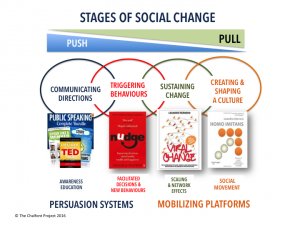Communicating, triggering behaviours, sustaining them and creating a culture, are all connected, interdependent, overlapping and parts of the chain of social change. But, they are completely different things. The trouble is the wrong expectations from the wrong approaches. Don’t expect lasting behavioural change or shaping a culture from activities that deal with messaging or even nudging. That should not stop you from messaging (sending communications and key information anchors) but don’t kid yourself thinking that you are modifying a culture in a lasting way.

Social change, and I use this term to include both internal (to the organization) cultural change and external (societal), has its own socio-behavioural rules. You would not run a Finance department with people who don’t understand accounting, but people run lots of ‘transformation and change’ with folk ideas about how personal and social change takes place.
When, for my new clients, I examine projects and programmes that have failed in their past, which creates a funny mixture of hope (‘surely there must be a better way’) and hurdle (‘here we go again’ effect), one key factor, above others, tend to be present: lack of provision, or even thinking, about the scale-up effect. I find a mixture of naïve approaches and plainly wrong behavioural assumptions.
From the former, naïve approaches, in particular the idea that leadership programmes, even broad ones across the board, have in themselves the power to create large scale behavioural and cultural change. People wonder why after a 3 year roll out of leadership workshops, nothing much happens other than creating a better educated and enlightened leader population. The equivalent in a political campaign would be educating activists on activism, and then hoping that the candidate will be miraculously elected.
On the later, the simply wrong assumptions, I find no one but multiple root causes of failure. For example:
The assumption that ‘Pulse shots’, particularly one off shots (off site motivational exercises and team building, what I have often called corporate flash mobs) have a lasting effect in a large population.
The excessive hope in rational explanations and exposures to arguments , even with a dose of (emotional) motivational salt and pepper. Unless there is a follow up mechanism and a ‘change platform’, it is unlikely to see large scale effects
The conscious or unconscious dissociation between ‘business’ (some times, day one of ‘the conference’) and ‘the soft stuff’, such a change or leadership or ‘motivational speeches’ (often afterwards day 2, or secondary) which perpetuates the idea that culture, leadership and people engagement are a nice add on.
Social change is large scale behavioural change that requires mechanisms of ‘scale up and sustain’ for those behaviours, and a clear understanding of the organization as an organism, as a network, not a top down piping system.
The Nudge approach of ‘behavioural economics’ originated in the Chicago School, has gained ground amongst policy makers who have understood that helping people making decisions easier (such as filling up tax forms) is good for everybody. ‘Nudge’ is far weaker in the sustainability of the effect, but has the same attraction of the simple one-off triggering, that seems more manageable than large scale sustained effects.
I feel strongly that Leadership Development needs to embrace behavioural and social sciences if it intends to produce scale-up effects. Team alignment is great, but the trick is how to embrace the other 2000 employees…Leadership in organizations is leadership of social change.